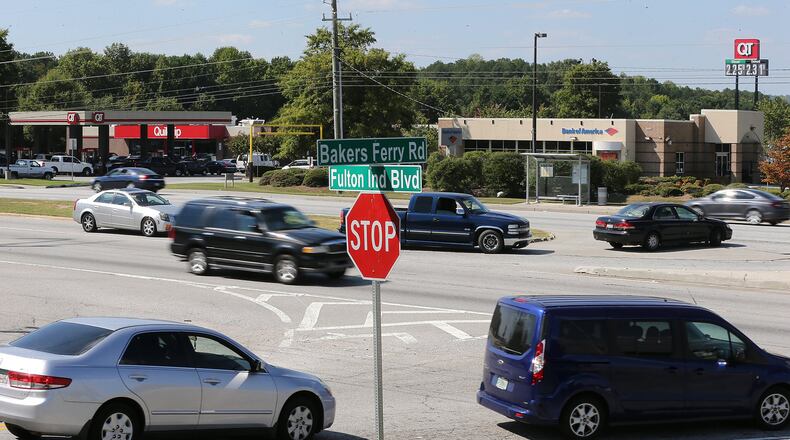A years-long struggle for control over Fulton County's last unincorporated area became a skirmish over millions of dollars in school tax money this week.
At issue is the city of Atlanta's desire to expand its border westward to include part of a 7.5-square-mile stretch of Fulton Industrial Boulevard. The city took its case to Fulton's state legislative delegation on Wednesday, which holds sway over a local bill that proposes Atlanta not get any of the land.
Atlanta officials say if they are able to annex part of the area, they would not bring Atlanta Public Schools with them — so the Fulton County school system would not lose any of the $10.3 million in tax dollars it currently collects.
Atlanta's pitch to Fulton's state lawmakers was its latest effort to gain control of the commercial district in the south part of Fulton County. The legislature is considering a plan that would annex nearly all of the area into the city of South Fulton, except for county-owned land near Charlie Brown Field, an airport that serves small planes. That plan would ensure that all of the school tax dollars in the Fulton Industrial District remain in Fulton schools.
Atlanta’s proposal was meant to ease the concerns of lawmakers, but several expressed skepticism that the city would be able to make good on its promise not to expand APS’ borders. For their part, Atlanta Public Schools officials have questioned whether such a plan would even be legal.
“Current law says that ain’t going to happen; that’s not true,” Rep. Roger Bruce, D-South Fulton, said of Atlanta’s proposal. “Under current law, if Atlanta annexed any of that area, it goes to the Atlanta school system.”
Bruce, for the third time, has put forward legislation that would put the district into the city of South Fulton. The measure has twice been approved by the legislature, only to be vetoed by then-Gov. Nathan Deal.
Atlanta and South Fulton have been sparring over the land since before the nascent city was incorporated two years ago. At stake are millions of dollars in tax revenue, as well as thousands of jobs.
Robert Highsmith, an attorney for the city of Atlanta, proposed that instead of passing Bruce's proposed legislation, the two cities split the unincorporated area, using Utoy Creek as a dividing line. In a letter to the delegation, he said some businesses north of the creek "oppose being forcibly annexed" into South Fulton.
He said Atlanta had been trying to negotiate an agreement with South Fulton, though South Fulton city officials denied that any negotiation was taking place.
The Atlanta City Council voted not to expand APS' boundaries when it annexed a piece of land it already owned in the Fulton Industrial area, though APS has filed suit against the city to ensure that its boundaries change as Atlanta's do. DeKalb County Schools are also fighting with APS over which school system will serve 744 acres around Emory University that were annexed into Atlanta 2017. The area only has about 10 students, but represents $2 million in tax revenue.
In a statement, APS spokesperson Ian Smith said Atlanta should know that any expansion of the city’s boundaries legally requires that the school district’s boundaries expand, as well. He said the city’s attempt “to cut APS out of a potential expansion is particularly disappointing in light of our close work with the City over the past several months” to reach a deal on the Gulch project.
“During those negotiations, the City frequently expressed a desire to partner with the schools,” Smith said. “It’s unfortunate that the City has now forgotten this supposed commitment to our partnership.”
The Fulton County Schools’ chief operations officer, Patrick Burke, and Linda Bryant, the president of the Fulton County school board, said there would be a significant impact to the district if any of the industrial area went to Atlanta, and APS. The tax revenue from the area funds more than 100 teaching positions in the county. Additionally, about 100 students would have to change schools if the area left the school district.
WHY IT MATTERS
Atlanta and the city of South Fulton both want to annex land in the last unincorporated part of Fulton County, the Fulton Industrial District. Atlanta has offered to make any annexation contingent on the borders of the Atlanta Public Schools staying the same. But APS — and some lawmakers — contend that promise may be illegal. At stake is $10.3 million in property tax money that currently goes to the Fulton County Schools, but that could be lost if the area is annexed into Atlanta. Officials say that money pays for 122 teachers in the county.
About the Author
Keep Reading
The Latest
Featured


